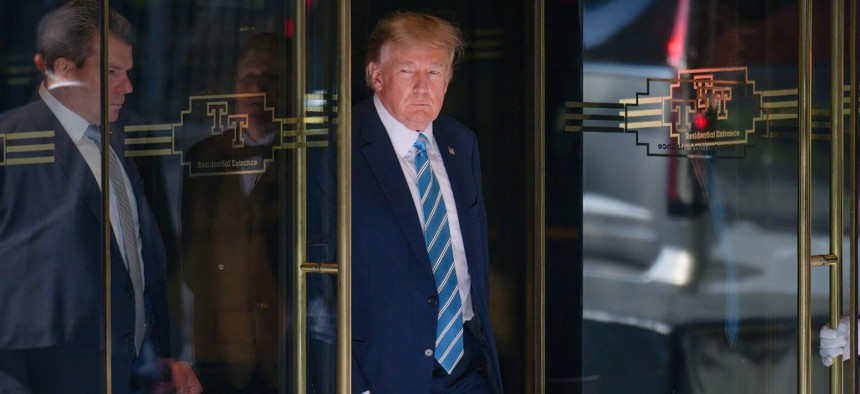
Former President Trump leaves his apartment in New York on May 31. James Devaney/GC Images
Days Before Trump Indictment, A Small Office Sounded the Alarm on Handling of Classified Information
The retiring director of the Information Security Oversight Office says he is leaving “with a deep sense of uneasiness;” a report from the office calls for more training of executive branch officials.
The executive branch needs more training on proper handling of classified information, a small and relatively unknown federal office said earlier this week, days before former President Trump announced he was indicted on Thursday in the classified documents probe.
The Information Security Oversight Office, located within the National Archives and Records Administration, submitted its annual report to the president on June 5. Retiring Director Mark Bradley said he’s leaving “with a deep sense of uneasiness” because there is so much left to do to rethink how the government classifies and declassifies information, and national security and the public’s trust in government are at risk.
“Over this past year, there has been an unprecedented level of focus on the proper handling of classified information and the guardrails, or the lack of them, in place to prevent its mishandling,” Bradley wrote. “To discourage future transgressions, including those committed at the very highest levels of our government, I believe that the executive branch, including the White House and its executive office, need to undergo and require much more rigorous training on how to handle classified information properly.”
Management of classified information has been a big topic of discussion recently due to the revelations about Trump, former Vice President Mike Pence and President Biden allegedly improperly handling documents, albeit each under different circumstances. On Friday, a 37 count indictment against Trump was unsealed, which included “Conspiracy to Obstruct Justice” and “Willful Retention of National Defense Information.” Pence was cleared last week in the investigation of documents found at his home in Indiana, and the special counsel’s investigation of Biden, whose aides and officials stress they’ve cooperated with investigators from the start, is ongoing.
The oversight office has a series of recommendations aimed at limiting such incidents in the future.
First, the White House and federal agencies should review their policies and training to ensure they are following the requirements of the executive order that governs how the executive branch classifies and declassifies national security information, the office said. “A greater level of prioritization and attention must be placed on this and there can be no exceptions or exemptions granted to these requirements,” Bradley wrote.
Other recommendations are: the information security office should work with the agencies to develop the training and help with training if needed; out-briefings for employees leaving, including the highest-level ones, must be “robust;” and the executive office of the president needs to report annually to the oversight office on its training efforts.
“Certain non-[National Security Council] elements of the [Executive Office of the President] have resisted this reporting requirement in the past and this must not happen again,” Bradley wrote.
Next, Bradley said that the oversight office is working on issuing updated guidance on the program it manages to retrieve classified information “that is improperly in private hands” and “has received a significant amount of media attention.”
NARA told Government Executive on Friday that the forthcoming document “further covers this subject matter and elevates awareness of the program and its related procedures and requirements. It will appear on this page once issued.”
Bradley called on the White House to quickly appoint his successor when it gets the nomination from the Archivist of the United States, saying this is too important of a role to remain unfilled, which happened for almost a year in 2016. The report contains other recommendations about updating the classification system and the offices that manage it.
The White House did not respond for comment on the report.
NEXT STORY: Democrats: It's Time for the DHS Watchdog to Go







